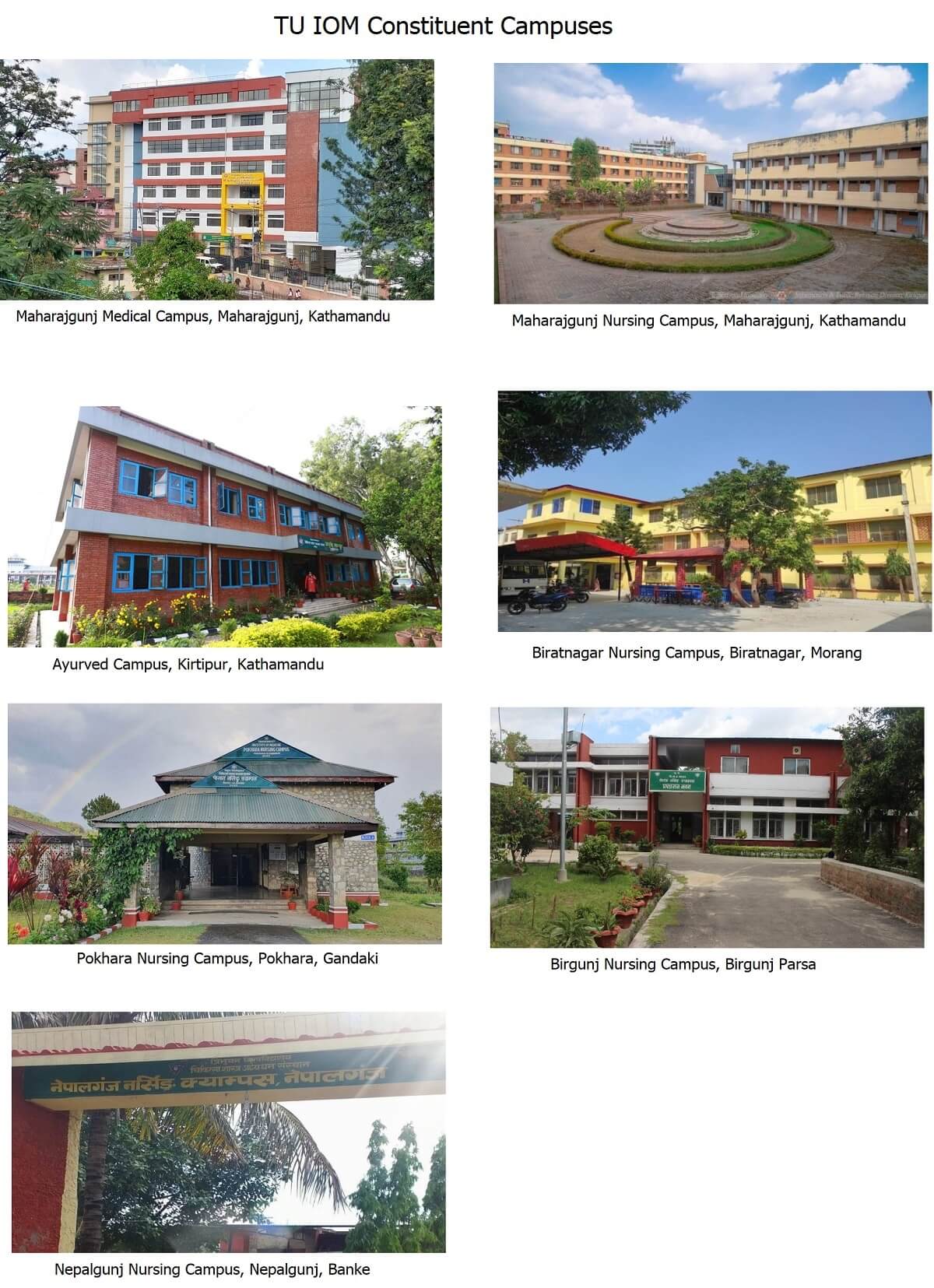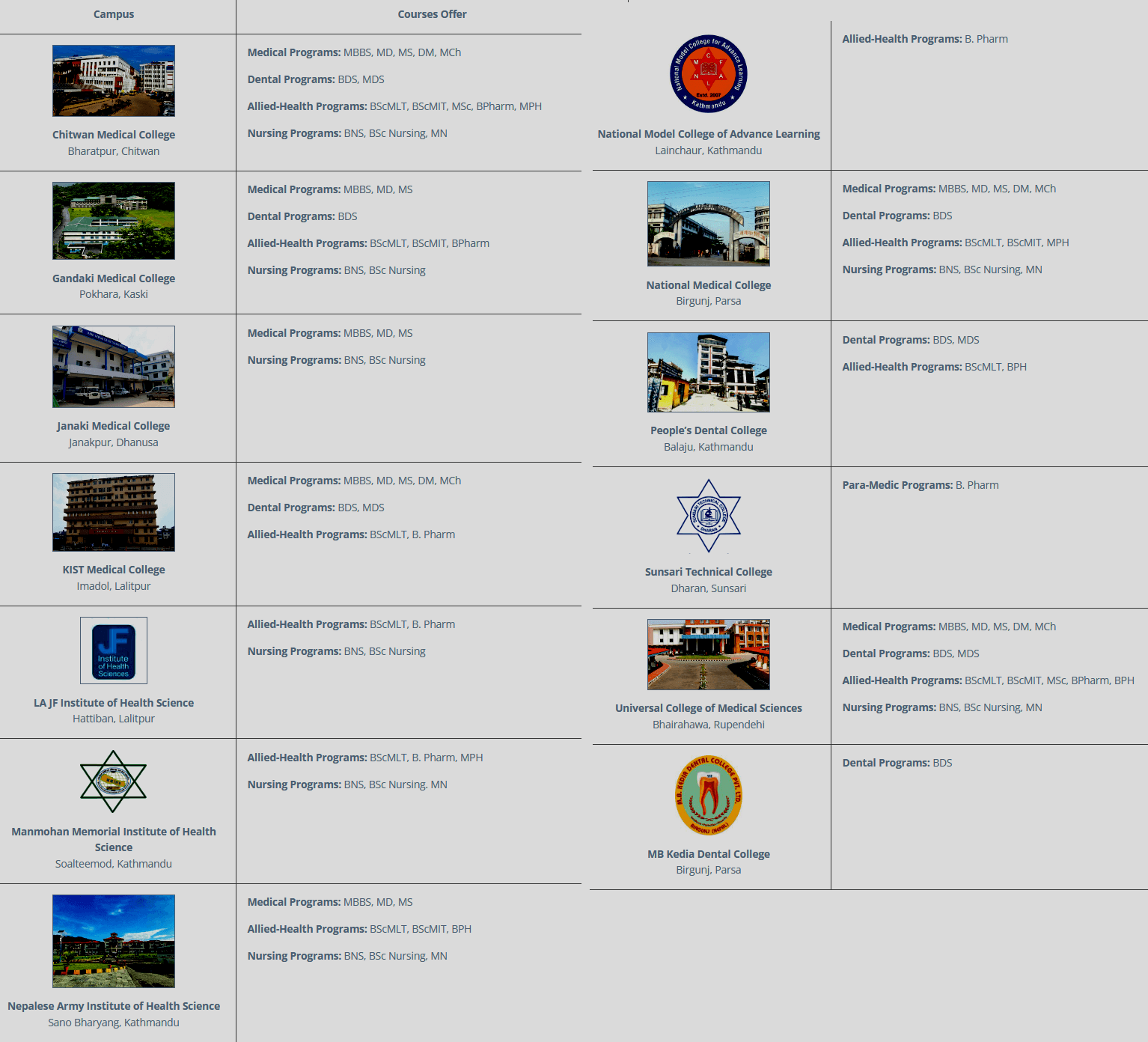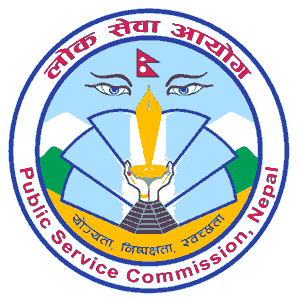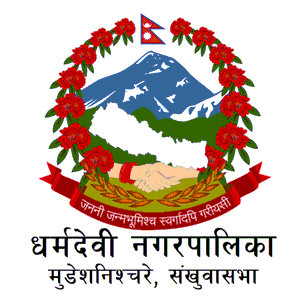Overview
The Institute of Medicine (IOM) was established in 1972 as a constituent institution of Tribhuvan University (TU) with a clear and urgent mission: to address Nepal’s growing need for trained healthcare professionals. Over the decades, it has evolved into a nationally significant institution that not only educates doctors, nurses, and allied health professionals but also contributes to policy-making, public health research, and advanced clinical services.
From modest beginnings focusing on mid-level health worker training, IOM TU has expanded its academic scope, infrastructure, and institutional partnerships to become a vital part of Nepal’s health sector. With campuses spread across the country and affiliations with many reputed colleges, IOM today is recognized as a central pillar of medical education in Nepal.
Quick Highlights
-
Established: 1972, under Tribhuvan University
-
Main Mission: To train healthcare professionals for Nepal’s evolving needs
-
Constituent Campuses: 7 (Medical, Nursing, Ayurved)
-
Affiliated Colleges: 13 across Nepal
-
Total Programs Offered: 60+ (PCL, MBBS to PhD and DM/MCh levels)
-
Major Academic Areas: Medicine, Dentistry, Nursing, Public Health, Ayurveda, Allied Health Sciences
-
Undergraduate Courses: MBBS, BDS, BAMS, BSc Nursing, BNS, BPH, BPharm, BSc MLT, BSc MIT, BASLP, BOptometry, B Perfusion Tech
-
Postgraduate & Super-Specialty: MD, MS, MDS, MN, MPH, MSc, DM, MCh, PhD, Fellowships
-
Main Teaching Hospital: Tribhuvan University Teaching Hospital (700 beds)
-
Research Focus Areas: Public health, maternal and child health, mental health, non-communicable diseases, traditional medicine
-
National Recognition: Central to Nepal’s medical education and health policy formulation
-
Global Partnerships: Collaborations with the University of Calgary, JICA, and other academic networks
-Building.jpg)
Historical Journey
Early Milestones (1972–1980s)
In its early years, IOM prioritized training programs aimed at meeting the country’s immediate need for mid-level healthcare workers. The first programs introduced included:
-
Auxiliary Nurse Midwife (ANM)
-
Community Medical Assistant (CMA)
-
Proficiency Certificate in General Medicine
-
Pharmacy
-
Radiology
-
Physiotherapy
-
Nursing
-
Health Laboratory Technology
-
Traditional Medicine
These programs played a foundational role in expanding access to basic healthcare, especially in rural and underserved regions.
In 1977, IOM took a significant step forward by introducing a graduate-level two-year Bachelor of Nursing Program. This course was designed to train nurses in three core areas:
-
Community Nursing
-
Pediatric Nursing
-
Adult Nursing
By 1978, the institute launched its community-oriented MBBS program with an initial intake of 22 students, eventually increasing to 40 due to growing demand and national need.
Building Clinical Infrastructure and Postgraduate Education (1980s)
A major achievement came in 1982 when the Tribhuvan University Teaching Hospital (TUTH), a 300-bed facility, was established with support from JICA (Japan International Cooperation Agency). This hospital became a central site for clinical training, patient care, and medical research.
That same year, postgraduate education at IOM took shape with the launch of a three-year MD in General Practice, developed in partnership with the University of Calgary in Canada. In 1984, IOM further expanded its clinical education by introducing a one-year Postgraduate Diploma in Anesthesiology.
Moving Toward Specialization (2000s Onward)
With the changing landscape of healthcare needs, IOM introduced MCh programs in Gastroenterology, Urology, Neurosurgery, and Cardiothoracic & Vascular Surgery in 2008. These programs marked the start of super-specialty education in the country.
By 2013, IOM was offering 29 different programs ranging from certificate to postgraduate degrees in medicine, public health, nursing, paramedics, and traditional medicine.
Academic Offerings and Campuses
Today, IOM operates a wide network of campuses and affiliated colleges. Its main constituent campuses include:
-
Maharajgunj Medical Campus (Kathmandu): Offers MBBS, BDS, MD, MS, DM, MCh, MPhil in Clinical Psychology, BPharm, BScMLT, MScMLT, BScMIT, MScMIT, BASLP, BOptometry, and BPerfusion Technology.
-
Maharajgunj Nursing Campus (Kathmandu): Offers BNS, BSc Nursing, MN (Adult Nursing, Community Health Nursing, Critical Care Nursing, Pediatric Nursing, Psychiatry Nursing, Women’s Health Development Nursing), and PhD in Nursing.
-
Ayurved Campus (Kirtipur): Offers BAMS and MD in Kaya Chikitsa (Ayurveda).
-
Biratnagar Nursing Campus (Morang): Offers BNS and BSc Nursing.
-
Birgunj Nursing Campus (Parsa): Offers BNS and BSc Nursing.
-
Pokhara Nursing Campus (Gandaki): Offers BNS, BSc Nursing, and MN.
-
Nepalgunj Nursing Campus (Banke): Offers BNS and BSc Nursing.
Each of these campuses focuses on specific academic disciplines but shares the same commitment to high-quality education and training.

Affiliated Institutions
IOM oversees 15 affiliated institutions across Nepal, each offering a wide array of academic programs in medical, dental, allied health, public health, and nursing disciplines.

These institutions are integral to expanding access to health science education nationwide. The affiliated colleges and their course offerings are:
-
Chitwan Medical College (Bharatpur, Chitwan): MBBS, MD, MS, DM, MCh, BDS, MDS, BScMLT, BScMIT, BPharm, MPH, BNS, BSc Nursing, MN.
-
Gandaki Medical College (Pokhara, Kaski): MBBS, MD, MS, BDS, BScMLT, BScMIT, BPharm, BNS, BSc Nursing.
-
Janaki Medical College (Janakpur, Dhanusa): MBBS, MD, MS, BNS, BSc Nursing.
-
KIST Medical College (Imadol, Lalitpur): MBBS, MD, MS, DM, MCh, BDS, MDS, BScMLT, BPharm.
-
LA JF Institute of Health Science (Hattiban, Lalitpur): BScMLT, BPharm, BNS, BSc Nursing.
-
Manmohan Memorial Institute of Health Sciences (Soalteemod, Kathmandu): BScMLT, BPharm, MPH, BNS, BSc Nursing, MN.
-
Nepalese Army Institute of Health Science (Sano Bharyang, Kathmandu): MBBS, MD, MS, BScMLT, BScMIT, BPH, BNS, BSc Nursing, MN.
-
National Model College of Advance Learning (Lainchaur, Kathmandu): BPharm.
-
National Medical College (Birgunj, Parsa): MBBS, MD, MS, DM, MCh, BDS, BScMLT, BScMIT, MPH, BNS, BSc Nursing, MN.
-
People’s Dental College (Balaju, Kathmandu): BDS, MDS, BScMLT, BPH.
-
Sunsari Technical College (Dharan, Sunsari): BPharm.
-
Universal College of Medical Sciences (Bhairahawa, Rupandehi): MBBS, MD, MS, DM, MCh, BDS, MDS, BScMLT, BScMIT, MSc, BPharm, BPH, BNS, BSc Nursing, MN.
-
MB Kedia Dental College (Birgunj, Parsa): BDS.
Together, these institutions play a crucial role in expanding IOM’s reach, offering students from diverse regions comprehensive academic options that align with national healthcare priorities.
Together, these institutions play a crucial role in expanding IOM’s reach, providing students from diverse regions with access to quality education.
Overview of Programs
Undergraduate Programs
IOM offers the following undergraduate programs:
-
MBBS – 4.5 years + 1 year compulsory rotating internship
-
BDS – 4.5 years + 1 year compulsory rotating internship
-
BAMS – 4.5 years + 1 year compulsory rotating internship
-
BPH – 4 years
-
B. Optometry – 4 years
-
BSc Medical Laboratory Technology (BSc MLT) – 4 years
-
BSc Medical Imaging Technology (BSc MIT) – 4 years
-
BPharm – 4 years
-
BASLP (Bachelor in Audiology and Speech Language Pathology) – 3 years + 1 year internship
-
BSc Nursing – 4 years
-
BNS (Bachelor in Nursing Science) – 3 years
-
B Perfusion Technology – 4 years
Postgraduate Programs
The postgraduate academic structure includes:
-
MD/MS Programs: General Practice, Internal Medicine, Dermatology, Psychiatry, Obstetrics & Gynaecology, Pediatrics, Pathology, Orthopaedics, and more.
-
MDS Programs: Offered in multiple dental specialties.
-
MN Programs: Community Health, Adult Nursing, Critical Care, Pediatric Nursing, Psychiatry, and Women’s Health Development.
-
MSc Programs: Clinical Biochemistry, Clinical Microbiology, Medical Imaging Technology.
-
MPH and other Public Health Programs: MPH, MHP&E, MPH Nutrition.
-
MPhil: Clinical Psychology.
Super-Specialty and Research-Based Programs
-
DM Programs: Cardiology, Critical Care, Emergency Medicine, Gastroenterology, Neurology, Nephrology.
-
MCh Programs: Cardiothoracic Surgery, Neurosurgery, Urology, Plastic Surgery, Surgical Gastroenterology.
-
PhD Programs: Available in Public Health, Medicine, and Nursing.
-
Clinical Fellowships: Short-term focused training in niche areas such as Musculoskeletal Imaging, Infertility, Spine Surgery, and Addiction Psychiatry.
Teaching Hospitals and Clinical Services
The Institute’s affiliated hospitals offer real-world training opportunities for students while also serving as vital healthcare centers:
-
Tribhuvan University Teaching Hospital (TUTH): A 700-bed tertiary hospital that serves as the primary teaching hospital for IOM.
-
Manmohan Cardiothoracic Vascular & Transplant Center
-
BP Koirala Lions Center for Ophthalmic Studies
-
Ayurveda Teaching Hospital
These facilities are equipped to offer comprehensive services, including emergency, surgical, diagnostic, and therapeutic care.
Institutional Governance
IOM is headed by the Dean and guided by a structured governance framework, including:
-
Faculty Board and its Standing Committee
-
Management and Development Council
-
Examination Board
-
Research and Ethics Committees
Assistant Deans manage Academic Affairs, Planning, Examination, Administration, and Information Technology. Each unit ensures that day-to-day operations align with long-term academic and institutional goals.
Research and Innovation
IOM emphasizes evidence-based research grounded in the local context. Through its Central Department of Public Health, partnerships with hospitals, and affiliated colleges, IOM continues to build a research culture that addresses pressing public health challenges in Nepal.
Priority areas include:
-
Maternal and Child Health
-
Infectious Disease Control
-
Mental Health
-
Non-communicable Diseases
-
Traditional Medicine and Ayurveda
Human Resources and Infrastructure
Maharajgunj Medical Campus is the largest and most academically active unit. It supports a diverse group of faculty, researchers, administrative staff, and over 700 medical students annually. TUTH, with its modern infrastructure and clinical departments, is central to both academic instruction and patient care.
Other campuses, such as the Ayurved Campus, have been granted autonomy, reflecting the IOM’s evolving governance approach. Across all its centers, IOM aims to offer well-equipped labs, libraries, hostels, and research spaces to support academic growth.
Community Role and Societal Impact
Beyond academics, IOM actively contributes to Nepal’s broader healthcare system. Alumni occupy leadership roles in hospitals, universities, public health institutions, and NGOs/INGOs across the country and internationally.
Students and faculty are often involved in:
-
Community outreach camps
-
Mobile health services
-
Rural internships
-
Awareness campaigns
These efforts enhance healthcare delivery at the grassroots level while offering experiential learning for students.
National and Global Collaborations
IOM has partnered with several international institutions for faculty training, research, and knowledge exchange. Its ongoing collaborations with universities like the University of Calgary have helped shape postgraduate and clinical programs. Nationally, IOM works closely with government agencies, Nepal Medical Council, and health-related NGOs to ensure academic programs stay aligned with national policies.
Message from the Dean
As a leading institution in medical education, we take pride in the role IOM has played in shaping Nepal's health landscape. We understand the responsibility that comes with educating the next generation of health professionals. Our vision extends beyond imparting knowledge — it is about cultivating compassionate, skilled, and responsible individuals who will make meaningful contributions to society.
Through academic rigor, research, and community involvement, we strive to uphold the standards set by our founding vision. Our focus is on ensuring academic quality, institutional transparency, and continued growth. IOM is not just a place of study—it is a community committed to progress.
Final Thoughts
The Institute of Medicine under Tribhuvan University stands as a crucial institution in Nepal's healthcare education sector. Its contribution is evident in the thousands of health professionals it has produced, the lives it has impacted, and the research it continues to generate.
As Nepal’s healthcare needs evolve, IOM is well-positioned to adapt, innovate, and lead. With a firm foundation in academic integrity, community commitment, and national service, it continues to prepare generations of healthcare professionals ready to serve the country and beyond.




